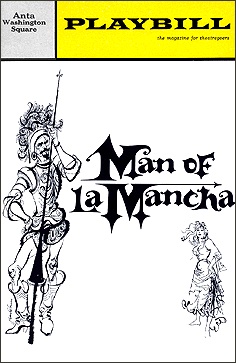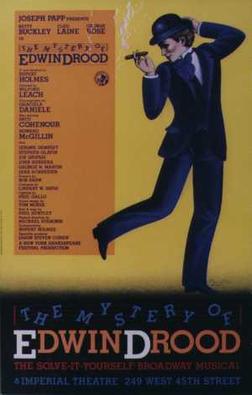Career
As a boy soprano
Richard began singing when he was nine years old. Possessing a true boy soprano voice, he was in great demand appearing in more than twenty plays, concerts and musicals before the age of twelve, including a co-star role as "Patrick Dennis" with Broadway actress Denise Lor in "Mame".
As an adult
After formal schooling Richard spent a year traveling around the world as a solo artist aboard The Royal Viking Star. Ports of call included; Australia, New Zealand, Bora Bora, Moorea, Singapore, Bangkok, Bali, Hong Kong, Shanghai, Beijing, Japan, Hawaii, Canada, Alaska and South America.
Following his lifelong friend and mentor Keith Keen to New York City, Richard made his Broadway debut (cast by writer Rupert Holmes and director Wilford Leach) in the New York Shakespeare Festival's Tony Award winning production of "The Mystery of Edwin Drood" [1] at the Imperial Theatre where he was placed into the show by Rob Marshall, assistant to show choreographer Graciela Daniele. Soon after, Richard starred off-Broadway, opposite George Hearn and Rob Morrow in the musical version of Chaim Potok's celebrated novel "The Chosen". [2]
Other credits include: "Windy City" at the Paper Mill Playhouse, a new musical workshop recording for Sheldon Harnick, and appearing as Billy Bigelow (opposite Rebecca Luker as "Julie) in the Lake George Opera Festival production of Rodgers and Hammerstein's "Carousel". In New York, Richard studied acting at HB Studios, also with John Hirsch and Sanford Meisner. Richard's NYC vocal coach was Andrew Cooke. During his first year in New York, Richard performed with "Harbor Lights" a vocal quartet that opened for headliners in the Catskills.
A solo appearance with the San Diego Symphony celebrating the 100th birthday of Cole Porter (Jack Everly Conductor) and a guest appearance at the Crystal Cathedral brought Richard to the West Coast, where he performed in the Hollywood Bowl Orchestra's musical recording for the classic science fiction movie "Thing's to Come".
In the summer of 1993, Richard was asked to perform in The "Tomorrows Realities Gallery" at the annual SIGGRAPH convention held in Anaheim, CA. as "Dynamation Man" giving voice and movement to a live, animated character. This event turned out to be the first live, operatic performance in digital real-time computer generated animation using a full upper-body Waldo and data glove with a single performing vocal artist interfaced with a character in total control. This project led Richard to perform and direct "A Musical Performance Animation" with composer Steven Bowen, an accomplished musician and arranger for the creation of a seven-minute singing musical story giving life to three computer generated characters; Pirate King, Reggae Man and the Sunny Boy, featured on CNN and in Computer Graphics World Magazine. [3]
In May 2003, Richard starred in the title role of the MAPA / Maui Civic Light Opera's production of Maury Yeston's Phantom [4] , directed by John Langs at the Maui Arts & Cultural Center Castle Theater.
Long Leaf Opera Company (Chapel Hill, North Carolina) production of "Kismet". [5] as the "Wazir".
Richard most recently performed in the Maui Academy of Performing Arts (MAPA) 2024 production of Man of La Mancha in the lead role as "Don Quixote / Miguel de Cervantes" opposite Amy Hānaialiʻi Gilliom as Aldonza / Dulcinea, directed by David C. Johnston at the Maui Arts & Cultural Center Castle Theater.
Other Work
Richard founded the "Performance Animation Society" a special interest group catering to the needs of performing and creative professionals involved with the emerging technology of performance capture. He developed and created dynamic and ongoing innovative and entertaining projects with what he calls "the future of performing artists" through this innovative forum.
- ↑ The Mystery of Edwin Drood Imperial Theatre
- ↑ ROTHSTEIN, MERVYN. How 'The Chosen' Became a Musical. The New York Times , January 3, 1988. Retrieved April 10, 2008.
- ↑ Robertson, Barbara. "Pioneers and Performers" - Computer Graphics World Magazine, November 1997.
- ↑ Janes-Brown, Paul. Phantom a must-see performance The Maui News, May 10, 2003. Retrieved April 10, 2008
- ↑ Lambert, John W. The Sands of Time – Long Leaf Opera Presents Kismet Classical Voice of North Carolina, March 22, 2006. Retrieved April 10, 2008

Man of La Mancha is a 1965 musical with a book by Dale Wasserman, music by Mitch Leigh, and lyrics by Joe Darion. It is adapted from Wasserman's non-musical 1959 teleplay I, Don Quixote, which was in turn inspired by Miguel de Cervantes and his 17th-century novel Don Quixote. It tells the story of the "mad" knight Don Quixote as a play within a play, performed by Cervantes and his fellow prisoners as he awaits a hearing with the Spanish Inquisition. The work is not and does not pretend to be a faithful rendition of either Cervantes' life or Don Quixote. Wasserman complained repeatedly about people taking the work as a musical version of Don Quixote.

Anthony Warlow is an Australian musical theatre performer, noted for his character acting and considerable vocal range. He is a classically trained lyric baritone and made his debut with the Australian Opera in 1980.

Kismet is a musical adapted by Charles Lederer and Luther Davis from the 1911 play of the same name by Edward Knoblock, with lyrics and musical adaptation by Robert Wright and George Forrest. The music was mostly adapted from several pieces composed by Alexander Borodin. The story concerns a wily poet who talks his way out of trouble several times; meanwhile, his beautiful daughter meets and falls in love with the young caliph.

George Harvey Presnell was an American actor and singer. He began his career in the mid-1950s as a classical baritone, singing with orchestras and opera companies throughout the United States.

Richard Paul Kiley was an American stage, film, and television actor and singer. He is best-known for his distinguished theatrical career in which he twice won the Tony Award for Best Actor in a Musical. Kiley created the role of Don Quixote in the original 1965 production of the Broadway musical Man of La Mancha and was the first to sing and record "The Impossible Dream", the hit song from the show. In the 1953 hit musical Kismet, he played the Caliph in the original Broadway cast and, as such, was one of the quartet who sang "And This Is My Beloved". Additionally, he won four Emmy Awards and two Golden Globe Awards during his 50-year career and his "sonorous baritone" was also featured in the narration of a number of documentaries and other films. At the time of his death, Kiley was described as "one of theater's most distinguished and versatile actors" and as "an indispensable actor, the kind of performer who could be called on to play kings and commoners and a diversity of characters in between."

Judy Kuhn is an American actress, singer and activist, known for her work in musical theatre. A four-time Tony Award nominee, she has released four studio albums and sang the title role in the 1995 film Pocahontas, including her rendition of the song "Colors of the Wind", which won its composers the Academy Award for Best Original Song.
The Grammy Award for Best Hawaiian Music Album was an honor presented to recording artists from 2005 to 2011 for quality Hawaiian music albums. The Grammy Awards, an annual ceremony that was established in 1958 and originally called the Gramophone Awards, are presented by the National Academy of Recording Arts and Sciences of the United States to "honor artistic achievement, technical proficiency, and overall excellence in the recording industry, without regard to album sales or chart position".

Joan Diener was an American theatre actress and singer with a three-and-a-half-octave range. As her obituary in The New York Times summed it up, Diener's "lush beauty, showstopping stage presence and operatic voice made her a favorite in musicals, especially in the original 1965 Man of La Mancha."

Doretta Morrow was an American actress, singer and dancer who appeared in stage and television productions during the 1940s and 1950s. She is best remembered for having created roles in the original productions of three successful Broadway musicals: Kitty Verdun in Where's Charley? (1948), Tuptim in The King and I (1951) and Marsinah in Kismet (1953). She co-starred in the 1952 Hollywood film Because You're Mine, as Mario Lanza's love interest. She appeared in several live television musicals. She retired from performance in 1960 at the age of 33.
Howard McGillin is an American actor. He is known for originating the role of John Jasper in The Mystery of Edwin Drood (1985) and for portraying the title role in Andrew Lloyd Webber's The Phantom of the Opera from 1999 to 2009 on Broadway.

The Mystery of Edwin Drood is a musical written by Rupert Holmes based on the unfinished Charles Dickens novel of the same name. The show was the first Broadway musical with multiple endings. The musical won five Tony Awards, including Best Musical; from among eleven nominations. Holmes received Tony awards for Best Book of a Musical and Best Original Score.
Robert Rounseville was an American actor and tenor, who appeared in opera, operetta, Broadway musicals, and motion pictures.
Albert Marre was an American stage director and producer. He directed the stage musical Man of La Mancha in 1965, for which he won the Tony Award for Best Director of a Musical.
Kimilee Karyn Bryant is an American actress, singer and former Miss South Carolina. Bryant is best known for playing the role of Christine Daaé in the Broadway and other productions of The Phantom of the Opera, and later the role of Carlotta in the same musical. She has sung at Lincoln Center's Avery Fisher Hall and played many roles in U.S. regional theatres and opera, including at New York City Center with the New York Gilbert and Sullivan Players. She has also performed in cabaret, film and television.

The Maui Academy of Performing Arts (MAPA) is a nonprofit theatre company that produces community theater and offers classes to children and young adults. Over the years, the mainstay of the Academy has been their drama, dance, and summer programs.

Amy Hānaialiʻi Gilliom is an American vocalist and songwriter.

Ronald E. Richardson was an American actor and operatic baritone. Richardson began his career in the mid-1970s appearing in regional theater and opera productions. He appeared in several Broadway musicals from 1978 to 1993, arguably best known for his Tony Award and Drama Desk Award-winning performance as "Jim" in the 1985 Broadway musical Big River.
Patricia Marand was an American actress and singer, best known for roles in musical theatre. She was nominated for a 1966 Tony Award for her part as Lois Lane in the musical It's a Bird...It's a Plane...It's Superman. She also appeared in the 1952 musical Wish You Were Here. She was a regular on The Merv Griffin Show.
Jack Harrold was an American operatic tenor and voice teacher. Admired for his comedic skills, he specialized in the tenor buffo repertoire. He had a particularly long association with the New York City Opera from the 1940s through the 1980s. He also appeared in several Broadway musicals. Danny Newman of the Lyric Opera of Chicago stated that, "Jack Harrold was one of American musical theater's most beloved and most versatile performers, possessing a clarion tenor voice that practically bounced off the back walls of the biggest theaters."

Rebecca Spencer is an American singer and actress, known for her roles in musicals and cabaret productions. Over the course of her career, Spencer has performed principal roles in over 50 opera, national tour, regional and Off-Broadway productions, including co-starring in Hollywood Bowl's 2019 production of Into the Woods. She created the role of Lisa Carew in the world premiere of Frank Wildhorn's Jekyll and Hyde at the Alley Theatre, opposite Linda Eder and Chuck Wagner, and premiered the role of Madame Giry in the $35 million production of Phantom - The Las Vegas Spectacular, under the direction of Harold Prince.












